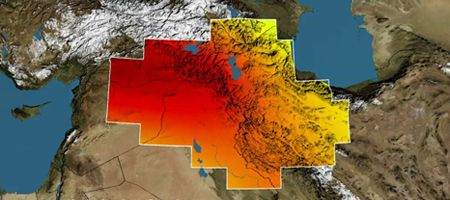The Middle East has lost fresh water reserves equivalent to the entire Dead Sea over the last ten years, data from NASA satellites shows.

A team using NASA’s Gravity Recovery and Climate Experiment (GRACE) satellites found that, between 2003 and 2010, parts of Turkey, Syria, Iraq and Iran along the Tigris and Euphrates river basins lost 144 cubic kilometers of its total stored fresh water.
That’s almost as much as in the Dead Sea, with the loss caused mainly by the pumping of groundwater from underground reservoirs.
“GRACE data show an alarming rate of decrease in total water storage in the Tigris and Euphrates river basins, which currently have the second fastest rate of groundwater storage loss on Earth, after India,” says Jay Famiglietti of UC Irvine.
“The rate was especially striking after the 2007 drought. Meanwhile, demand for freshwater continues to rise, and the region does not coordinate its water management because of different interpretations of international laws.”
Famiglietti describes GRACE as ‘like having a giant scale in the sky’. Within a given region, rising or falling water reserves alter Earth’s mass, influencing how strong the local gravitational attraction is. By periodically measuring gravity regionally, GRACE reveals how much each region’s water storage changes over time.
“GRACE really is the only way we can estimate groundwater storage changes from space right now,” Famiglietti said.
The team calculated that about one-fifth of the water losses resulted from soil drying up and snowpack shrinking, partly because of a drought in 2007. Loss of surface water from lakes and reservoirs accounted for about another fifth of the losses. However, the majority of the water lost – around 90 cubic kilometers- was due to a loss of groundwater.
“That’s enough water to meet the needs of tens of millions to more than a hundred million people in the region each year, depending on regional water use standards and availability,” said Famiglietti.
After the 2007 drought, the Iraqi government drilled about 1,000 wells – and private landowners a lot more.
“The Middle East just does not have that much water to begin with, and it’s a part of the world that will be experiencing less rainfall with climate change,” said Famiglietti. “Those dry areas are getting dryer. The Middle East and the world’s other arid regions need to manage available water resources as best they can.”
Study co-author Matt Rodell of Goddard adds that it’s worth remembering that groundwater is being extracted unsustainably in parts of the United States, as well.
“Groundwater is like your savings account,” he says. “It’s okay to draw it down when you need it, but if it’s not replenished, eventually it will be gone.”






